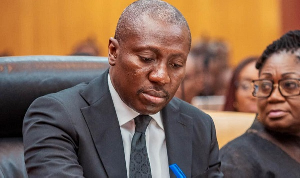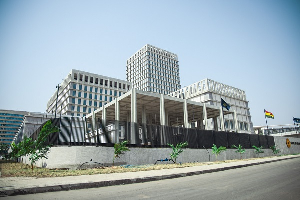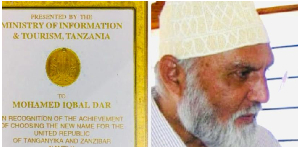A response to Professor Niall Ferguson
Dear Sir: Professor Niall Ferguson in his article “Independence? Try 'aid-dependence': Colonialism didn't cause Africa's problems, and aid alone won't fix them” published on March 11, 2007 in the LA Times argued that Ghana couldn’t justify spending $20m to mark 50 years of independence from Britain because it was in receipt of food aid from the US. Sadly it is our leaders who have lost confidence in themselves, go globe-trotting for charity handouts and given ammunition to the likes of Professor Ferguson who are nothing but apologists for British colonialism and imperialism. Until our leaders learn that nobody owes Ghanaians and Africans a living and that we have to develop our country through hard work and sacrifice, the likes of Professor Ferguson will continue to present their half-truths as gospel. Even so, the revisionism of this intellectual high-priest of the apologists for British colonial rule should not be allowed to go unchallenged.Priyamvada Gopal of Cambridge University observed (in an article for the UK Guardian on Wednesday June 28, 2006 – “The story peddled by imperial apologists is a poisonous fairytale”) that the soundbite culture of the modern political era provides fertile ground for the “simplistic grand narratives” of the likes of Professor Ferguson. She wrote: “half-truths and fanciful speculation, shorn of academic protocols such as footnotes, can sound donnishly authoritative.” And Professor Ferguson has been rather good at exploiting the yearnings of many in the West who wish to white-wash the colonial experience by offering as historical fact, the type of half-truths he peddled in his article for LA Times, much of which was unsubstantiated and are in our opinion without foundation. It is therefore no surprise that Gopal accuses him of peddling “nothing more than the most hackneyed, self-aggrandising myths of empire, canards once championed by old imperialists such as Macaulay and Mill.”
Professor Ferguson, once again, seeks to exonerate colonialists by suggesting that “…the economic consequences of independence gave the lie to the old leftist claim that Britain was exploiting its colonies”. An example of Ferguson’s historical revisionism Gopal described as a “fairytale for our times which puts the white man and his burden back at the centre of heroic action. Colonialism - a tale of slavery, plunder, war, and corruption, land-grabbing, famines, exploitation, indentured labour, impoverishment, massacres, genocide and forced resettlement - is rewritten into a benign developmental mission marred by a few unfortunate accidents and excesses.”
As an acknowledged expert in the history of financial services, Professor Ferguson will know of the role the Gold Coast played in stabilizing sterling circa1951 – 1955, as Dr Kwame Nkrumah, the first Prime Minster of Ghana, was quick to remind his audience - including the Duchess of Kent who represented Her Majesty Queen Elizabeth II - at independence in 1957. He said: “The Gold Coast has contributed, on an average, 25% of the net dollar earnings of the British colonial territories, and taking into account our contribution of around £9 million a year in gold, in the five years from 1951 to 1955 in which [Kwame Nkrumah's] Convention People's Party have been in power, the Gold Coast contributed a net positive balance of £153 million to the gold and dollar reserves of the sterling area. It will be seen therefore, that though the Gold Coast is small, by Western standards, not a very wealthy country, it has made a significant contribution to maintaining the stability of the sterling area". More importantly, it was the sweat of ordinary Ghanaian cocoa farmers and workers in the mines that helped stabilize sterling after World War II and no doubt contributed to the post-war reconstruction of which Professor Ferguson was a beneficiary.
The Professor’s description of the then Gold Coast as one of “Britain's African possessions [sic]” betrays a level of insensitivity and corruption of mind that disqualifies him from any objective and dispassionate assessment of colonial history. Even so, he fails to explain what constituted ‘advanced’ in relation to the British achievement in over 100 years of running much of the Gold Coast from 1844. In 1951 when the first All-African government assumed office some 235,000 pupils were enrolled in primary schools. By 1955, four years after Kwame Nkrumah’s first All-African government had been in power, the number of children enrolled had risen by 85% to 430,000. By 1965, over 1.2 million children were enrolled and today primary school enrollment stands at close to 3 million. The story is no different in secondary education with enrollment shooting up from a mere 3,559 in 1951 to approximately 1.35 million in 2005 according to the World Bank.
Great strides have also been made in health. In 1955, there was one medical doctor per 25,000 inhabitants of the Gold Coast. Today, according to the World Bank, there are 1.5 physicians to 10,000 patients even though the population has quadrupled since independence. This is thanks to the establishment of local medical schools by Nkrumah’s post-colonial government which incidentally are producing doctors for the United Kingdom, United States when only fifty years ago, all of Ghana’s 150 doctors were trained abroad.
There are countless other examples of real improvements including the number of universities, graduates, hospital beds constituting an achievement which many countries would be proud of. If you include the building of the Akosombo dam for generating hydro-electric power (at £70 million, 50% of which was borne by the Ghanaian tax payer), the building of a whole new township at Tema to serve as an industrial zone, the building of Okomfo Anokye Hospital in Kumase and regional hospitals, and exponential growth in educational facilities by the beginning of 1966, it exposes the lie of Professor Ferguson that Nkrumah’s programmes were simply a “classic case of jobs for the boys”.
Above all, however, Ghana, a multi-ethnic society, has been a haven of peace for much of the past 50 years in a region that has had its share of civil wars, breakdown of civil society and the near-collapse of nation-states, from Sierra Leone to Nigeria.
It is true that countries such as Malaysia and Singapore have advanced more rapidly than Ghana but the blame for that must lie with those who sought to truncate Ghana’s independent approach to development and geo-politics and drove the country down a spiral of military interventions with deleterious consequences from which it has yet to fully recover.
Just because Ghana has been unable to achieve everything it dreamed for itself in 1957 does not in anyway prove colonial rule was not exploitative and if, as Gopal advices, “we are to undo the destructive legacies of empire, it won't do to invest celebratory falsifications with credibility. To make sense of a shared present and look towards a more humane future, we need to start with a little informed honesty about the past.”
Professor Ferguson’s suggestion that Nkrumah's political record was even worse, not least because of his disastrous decision to turn to the “Soviets for 'advice' on internal security", is another attempt at rewriting history. Nkrumah turned to every country he could get help from in his attempt to industrialize Ghana. In fact, three days before the coup that overthrew his government in 1966, Ghana had signed an agreement with Kaiser to irrigate the mighty Accra plains to turn the area into a food producing area? Is Kaiser "Soviet"? Sanyo, a Japanese company, had an assembly plant in the new township and industrial zone at Tema. "Akasanoma" factory for assembling radios, and fridges by Phillips of Holland and Valco by Kaiser of the US were all in Tema, and are not "Soviet" are they? Further, Nkrumah's government secured in Nkrumah's words "the expert assistance from the Bank of England" in establishing the Bank of Ghana.
Professor Ferguson claims he could not “really…see much to celebrate if independence [Ghana’s independence] is just a euphemism for aid-dependence”. It is, however, worth noting that in the late 1940s and early 1950s, Britain was on the verge of bankruptcy and economic collapse and it received loans of $4.34 billion from the US and $1.2 billion from Canada at 2% interest spread over 50 years. Britain paid the last installment of this debt - £45m – only three months ago in December 2006. Yet in 1951, a year after the loans went into service, Britain mounted a spectacular display of national celebration under Sir Herbert Morrsion in The Festival of Britain.
Much of Britain was in ruins after the war and needed redevelopment; unemployment was high as was poverty and rationing had barely ended. Yet in the midst of hardship and having just borrowed significant amounts of money from the Americans and Canadians to rebuild their nation, they saw it fit and proper to have a party which Morrsion described as “a tonic for the Nation". No one will begrudge the British their tonic and neither should we.
The only difference, and here critics of our celebration may have a point, is that The Festival of Britain had another dimension: the promotion of better-quality design in the rebuilding of British towns and cities following the war, as part of the Labour Government’s promise not to revert to status quo ante. As veteran Labour politician Tony Benn put it, they were spurred on by the belief that if they could unite and pool the country’s resources to fight a war and defeat Germany, they could do the same to eradicate poverty and hunger. A noble and admirable socialist ideal indeed!
Unfortunately, The Festival of Britain gave us much of the 1960s architecture which many traditionalists bemoan. Be that as it may, there was purpose and direction to the celebrations. Ghana, on the other hand, did not build a monument for this occasion or posterity. Nor was there a galvanizing purpose to its celebrations. Instead, they purchased a fleet of expensive vehicles and organised a military parade for a democratic nation that is neither a military power nor has any significant military might to speak of.
When the British celebrate their anniversaries with a display of military symbolism and pageantry, it is precisely because they were historically a military power and much of what they have achieved has been through conquest and military force. When the Chinese, Russians and North Koreans do the same, it is to demonstrate military might and to warn-off any would be aggressors.
What then, was the purpose of showing-off Ghana’s paltry armoured personnel carriers, (APCs), high mobility multipurpose wheeled vehicles (‘humvees’) and a couple of fighter jets granted Ghana by other countries when it has no military past (collectively) to boast off? Why this obsession with militarism when Ghana has no significant military might or history to speak of? OK, Ghana has a history in peace-keeping so let the peace-keepers be part of the celebrations but to invite foreign dignitaries including 30 heads of state to Accra to watch a military parade was as unimaginative as it was unbelievable. A hundred girls dancing the ‘agbadza’ (the traditional dance of the Ewe people) with the grace that attends it, would have said more about Ghana than a second-rate military parade by a third-rate military power.
Anyway, back to Ferguson. The continued indebtedness of Britain did not stop his country from spending millions of pounds celebrating the golden jubilee of the Queen's accession only a few years ago. If it was good for Britain to celebrate victory in war when Britain was in debt it was legitimate for Ghanaians to seek to celebrate their own triumphs.
Ghana’s achievements may indeed not be as much as many of its citizens had hoped for in 1957, but they are a darn side better than what the British left behind in over 100 years of colonial rule and that alone makes the 50th anniversary worth celebrating. We just should have celebrated with some purpose and panache of the kind the ‘show boy’ [Nkrumah] would have approved. Sadly, it looks like those who lead us have not only lost confidence in themselves; they have neither taste nor vision.



















